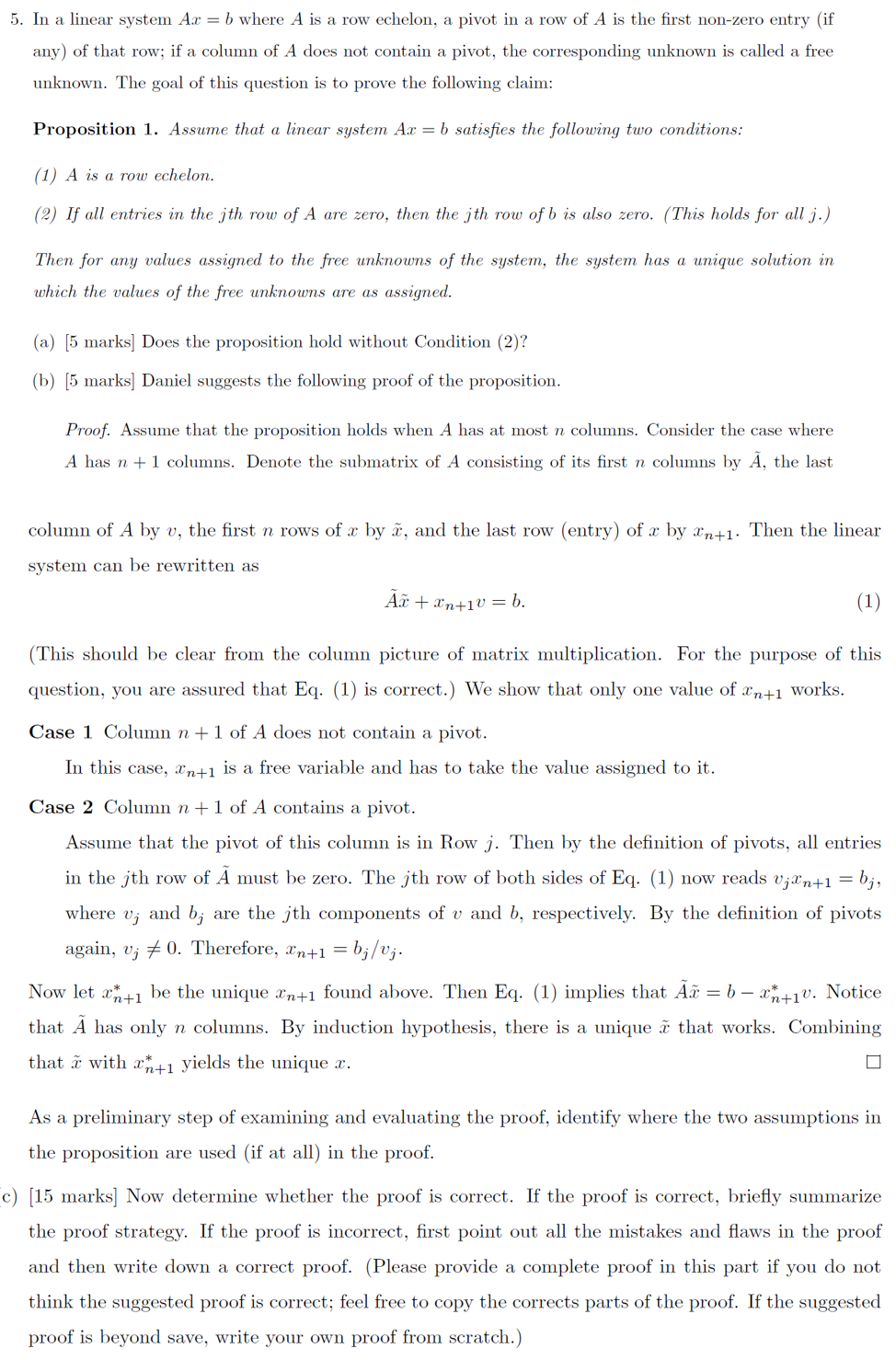Part (a) and (b) have been solved, you only need to solve part (c).
You can check the answers of (a) and (b) in the following link:
https://www.chegg.com/homework-help/questions-and-answers/5-linear-system-ac-b-row-echelon-pivot-row-first-non-zero-entry-row-column-contain-pivot-c-q45499204?trackid=2dc582afb46e&strackid=dc6827176510

5. In a linear system Ax = b where A is a row echelon, a pivot in a row of A is the first non-zero entry (if any) of that row; if a column of A does not contain a pivot, the corresponding unknown is called a free unknown. The goal of this question is to prove the following claim: Proposition 1. Assume that a linear system Ax = b satisfies the following two conditions: (1) A is a row echelon. (2) If all entries in the jth row of A are zero, then the jth row of b is also zero. (This holds for all j.) Then for any values assigned to the free unknowns of the system, the system has a unique solution in which the values of the free unknowns are as assigned. (a) [5 marks] Does the proposition hold without Condition (2)? (b) [5 marks) Daniel suggests the following proof of the proposition. Proof. Assume that the proposition holds when A has at most n columns. Consider the case where A has n + 1 columns. Denote the submatrix of A consisting of its first n columns by A, the last column of A by v, the first n rows of x by, and the last row (entry) of x by In+1. Then the linear system can be rewritten as + Xn+10 = b. (1) (This should be clear from the column picture of matrix multiplication. For the purpose of this question, you are assured that Eq. (1) is correct.) We show that only one value of xn+1 works. Case 1 Column n +1 of A does not contain a pivot. In this case, Xn+1 is a free variable and has to take the value assigned to it. Case 2 Column n +1 of A contains a pivot. Assume that the pivot of this column is in Row j. Then by the definition of pivots, all entries in the jth row of A must be zero. The jth row of both sides of Eq. (1) now reads vjln+1 = b;, where Vj and b; are the jth components of v and b, respectively. By the definition of pivots again, v; + 0. Therefore, In+1 = b;/vj. Now let xm +1 be the unique Int1 found above. Then Eq. (1) implies that = b +10. Notice that A has only n columns. By induction hypothesis, there is a unique that works. Combining that with x+1 yields the unique x. As a preliminary step of examining and evaluating the proof, identify where the two assumptions in the proposition are used (if at all) in the proof. c) [15 marks] Now determine whether the proof is correct. If the proof is correct, briefly summarize the proof strategy. If the proof is incorrect, first point out all the mistakes and flaws in the proof and then write down a correct proof. (Please provide a complete proof in this part if you do not think the suggested proof is correct; feel free to copy the corrects parts of the proof. If the suggested proof is beyond save, write your own proof from scratch.) 5. In a linear system Ax = b where A is a row echelon, a pivot in a row of A is the first non-zero entry (if any) of that row; if a column of A does not contain a pivot, the corresponding unknown is called a free unknown. The goal of this question is to prove the following claim: Proposition 1. Assume that a linear system Ax = b satisfies the following two conditions: (1) A is a row echelon. (2) If all entries in the jth row of A are zero, then the jth row of b is also zero. (This holds for all j.) Then for any values assigned to the free unknowns of the system, the system has a unique solution in which the values of the free unknowns are as assigned. (a) [5 marks] Does the proposition hold without Condition (2)? (b) [5 marks) Daniel suggests the following proof of the proposition. Proof. Assume that the proposition holds when A has at most n columns. Consider the case where A has n + 1 columns. Denote the submatrix of A consisting of its first n columns by A, the last column of A by v, the first n rows of x by, and the last row (entry) of x by In+1. Then the linear system can be rewritten as + Xn+10 = b. (1) (This should be clear from the column picture of matrix multiplication. For the purpose of this question, you are assured that Eq. (1) is correct.) We show that only one value of xn+1 works. Case 1 Column n +1 of A does not contain a pivot. In this case, Xn+1 is a free variable and has to take the value assigned to it. Case 2 Column n +1 of A contains a pivot. Assume that the pivot of this column is in Row j. Then by the definition of pivots, all entries in the jth row of A must be zero. The jth row of both sides of Eq. (1) now reads vjln+1 = b;, where Vj and b; are the jth components of v and b, respectively. By the definition of pivots again, v; + 0. Therefore, In+1 = b;/vj. Now let xm +1 be the unique Int1 found above. Then Eq. (1) implies that = b +10. Notice that A has only n columns. By induction hypothesis, there is a unique that works. Combining that with x+1 yields the unique x. As a preliminary step of examining and evaluating the proof, identify where the two assumptions in the proposition are used (if at all) in the proof. c) [15 marks] Now determine whether the proof is correct. If the proof is correct, briefly summarize the proof strategy. If the proof is incorrect, first point out all the mistakes and flaws in the proof and then write down a correct proof. (Please provide a complete proof in this part if you do not think the suggested proof is correct; feel free to copy the corrects parts of the proof. If the suggested proof is beyond save, write your own proof from scratch.)







